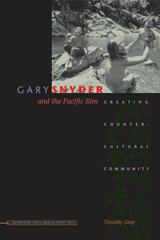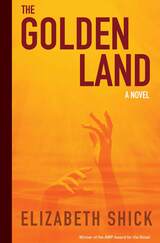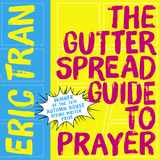161 books about Asian American & Pacific Islander and 5
start with G
161 books about Asian American & Pacific Islander and 5
161 books about Asian American & Pacific Islander
5 start with G start with G
5 start with G start with G

Gary Snyder and the Pacific Rim
Creating Countercultural Community
Timothy Gray
University of Iowa Press, 2006
In Gary Snyder and the Pacific Rim, Timothy Gray draws upon previously unpublished journals and letters as well as his own close readings of Gary Snyder’s well-crafted poetry and prose to track the early career of a maverick intellectual whose writings powered the San Francisco Renaissance of the 1950s and 1960s. Exploring various aspects of cultural geography, Gray asserts that this west coast literary community seized upon the idea of a Pacific Rim regional structure in part to recognize their Orientalist desires and in part to consolidate their opposition to America’s cold war ideology, which tended to divide East from West. The geographical consciousness of Snyder’s writing was particularly influential, Gray argues, because it gave San Francisco’s Beat and hippie cultures a set of physical coordinates by which they could chart their utopian visions of peace and love.
Gray’s introduction tracks the increased use of “Pacific Rim discourse” by politicians and business leaders following World War II. Ensuing chapters analyze Snyder’s countercultural invocation of this regional idea, concentrating on the poet’s migratory or “creaturely” sensibility, his gift for literary translation, his physical embodiment of trans-Pacific ideals, his role as tribal spokesperson for Haight-Ashbury hippies, and his burgeoning interest in environmental issues. Throughout, Gray’s citations of such writers as Allen Ginsberg, Philip Whalen, and Joanne Kyger shed light on Snyder’s communal role, providing an amazingly intimate portrait of the west coast counterculture. An interdisciplinary project that utilizes models of ecology, sociology, and comparative religion to supplement traditional methods of literary biography, Gary Snyder and the Pacific Rim offers a unique perspective on Snyder’s life and work.
This book will fascinate literary and Asian studies scholars as well as the general reader interested in the Beat movement and multicultural influences on poetry.
Gray’s introduction tracks the increased use of “Pacific Rim discourse” by politicians and business leaders following World War II. Ensuing chapters analyze Snyder’s countercultural invocation of this regional idea, concentrating on the poet’s migratory or “creaturely” sensibility, his gift for literary translation, his physical embodiment of trans-Pacific ideals, his role as tribal spokesperson for Haight-Ashbury hippies, and his burgeoning interest in environmental issues. Throughout, Gray’s citations of such writers as Allen Ginsberg, Philip Whalen, and Joanne Kyger shed light on Snyder’s communal role, providing an amazingly intimate portrait of the west coast counterculture. An interdisciplinary project that utilizes models of ecology, sociology, and comparative religion to supplement traditional methods of literary biography, Gary Snyder and the Pacific Rim offers a unique perspective on Snyder’s life and work.
This book will fascinate literary and Asian studies scholars as well as the general reader interested in the Beat movement and multicultural influences on poetry.
[more]

Ghost Of
Diana Khoi Nguyen
Omnidawn, 2018
Ghost Of is a mourning song, not an exorcism or un-haunting of that which haunts, but attuned attention, unidirectional reaching across time, space, and distance to reach loved ones, ancestors, and strangers. By working with, in, and around the photographs that her brother left behind (from which he cut himself out before his death), Nguyen wrestles with what remains: memory, physical voids, and her family captured around an empty space.
[more]

The Golden Land
Elizabeth Shick
New Issues Poetry and Prose, 2022
Winner of the AWP Prize for the Novel, this debut novel digs deep into the complexities of family history and relationships.
When Etta's grandmother dies, she is compelled to travel to Myanmar to explore complicated adolescent memories of her grandmother's family and the violence she witnessed there. Full of rich detail and complex relationships, The Golden Land explores those personal narratives that might lie beneath the surface of historical accounts.
When Etta's grandmother dies, she is compelled to travel to Myanmar to explore complicated adolescent memories of her grandmother's family and the violence she witnessed there. Full of rich detail and complex relationships, The Golden Land explores those personal narratives that might lie beneath the surface of historical accounts.
[more]

The Gutter Spread Guide to Prayer
Eric Tran
Autumn House Press, 2020
In The Gutter Spread Guide to Prayer, Eric Tran contends with the aftermath of a close friend’s suicide while he simultaneously explores the complexities of being a gay man of color. Grief opens into unraveling circles of inquiry as Tran reflects on the loss of his friend and of their shared identity as gay Asian American men. Through mourning and acute observations, these poems consider how those who experience marginalization, the poet included, may live and fall victim to tragedy. Tran explores how his life, even while in the company of desire and the pursuit of freedom, is never far from danger. Like grief that makes the whole world seem strange, Tran’s poetry merges into fantasy lands and rides the lines between imagined worlds and the reality of inescapable loss. At the intersection of queerness, loss, and desire, Tran uses current events, such as the Pulse nightclub tragedy, pop culture references, and comic book allusions to create a unique and textured poetry debut. He employs an unexpected pairing of prayer and fantasy allowing readers to imagine a world of queer joy and explore how grief can feel otherworldly. This collection shows a poet learning how to be afraid, to feel lost, to grieve, and to build a life amid precarious circumstances. The Gutter Spread Guide to Prayer was the winner of the Autumn House Rising Writers Prize in 2019.
[more]

The Gutter Spread Guide to Prayer
Eric Tran
Autumn House Press, 2020
In The Gutter Spread Guide to Prayer, Eric Tran contends with the aftermath of a close friend’s suicide while he simultaneously explores the complexities of being a gay man of color. Grief opens into unraveling circles of inquiry as Tran reflects on the loss of his friend and of their shared identity as gay Asian American men. Through mourning and acute observations, these poems consider how those who experience marginalization, the poet included, may live and fall victim to tragedy. Tran explores how his life, even while in the company of desire and the pursuit of freedom, is never far from danger. Like grief that makes the whole world seem strange, Tran’s poetry merges into fantasy lands and rides the lines between imagined worlds and the reality of inescapable loss. At the intersection of queerness, loss, and desire, Tran uses current events, such as the Pulse nightclub tragedy, pop culture references, and comic book allusions to create a unique and textured poetry debut. He employs an unexpected pairing of prayer and fantasy allowing readers to imagine a world of queer joy and explore how grief can feel otherworldly. This collection shows a poet learning how to be afraid, to feel lost, to grieve, and to build a life amid precarious circumstances. The Gutter Spread Guide to Prayer was the winner of the Autumn House Rising Writers Prize in 2019.
[more]
READERS
Browse our collection.
PUBLISHERS
See BiblioVault's publisher services.
STUDENT SERVICES
Files for college accessibility offices.
UChicago Accessibility Resources
home | accessibility | search | about | contact us
BiblioVault ® 2001 - 2024
The University of Chicago Press









